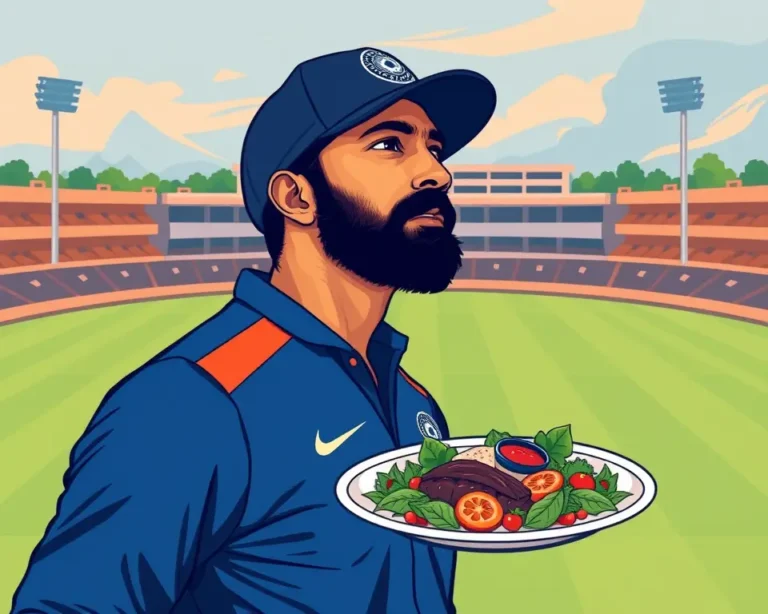Indian fast bowler Mohammed Shami has revealed a surprising secret to his fitness and peak performance: eating only one meal a day. The 34-year-old athlete, known for his speed and accuracy, shared that he has been following this unconventional dietary approach since 2015. This revelation has sparked interest and discussion among athletes and fitness enthusiasts alike.
The One-Meal-a-Day (OMAD) Approach
Shami’s diet consists of consuming only dinner, completely skipping breakfast and lunch. This eating pattern is a form of intermittent fasting known as OMAD, or “one meal a day”. While it may seem extreme, Shami claims that he has adapted well to it.
Shami’s Revelation
In a recent interview with former Indian cricketer Navjot Singh Sidhu, Shami explained his dietary choices. “After 2015, I only have one meal a day. I only have dinner; no breakfast, no lunch. It is very difficult to do such a thing, but once you get used to it, then it becomes very easy,” Shami said.
The Motivation Behind the Diet
Shami’s decision to adopt the OMAD approach stemmed from a desire to improve his fitness and performance. After making his international debut in 2013, he began focusing on his fitness a couple of years later. The results have been evident, as he has become one of the best ODI and Test bowlers in the world.
The Science of OMAD and Intermittent Fasting
Intermittent fasting (IF) involves cycling between periods of eating and voluntary fasting on a regular schedule. The OMAD diet is one of the more extreme versions of IF. While research on OMAD specifically is limited, there’s a growing body of evidence on the potential benefits and drawbacks of intermittent fasting in general, and its effects on athletic performance.
Potential Benefits
- Weight Management: IF can lead to a reduction in calorie intake, which can contribute to weight loss. Shami himself lost nine kilograms during his rehabilitation period following an ankle injury.
- Improved Body Composition: Some studies suggest that IF can help reduce body fat while maintaining lean muscle mass.
- Enhanced Focus: Some proponents of IF claim that fasting can improve mental clarity and focus.
- Increased Energy Production: It’s suggested that fasting may increase energy production within cells.
- Boost in Growth Hormones: Fasting may lead to an increase in the production of growth hormones.
Potential Drawbacks and Considerations
- Nutrient Deficiencies: Eating only one meal a day can make it challenging to obtain all the necessary nutrients.
- Muscle Loss: If not carefully planned, IF could potentially lead to muscle loss, especially when combined with intense physical activity.
- Energy Levels: Some individuals may experience fatigue or low energy levels, especially when first starting IF.
- Social Implications: The OMAD diet can be socially restrictive, as it may be difficult to participate in meals with friends or family.
- Not Suitable for Everyone: IF is not recommended for pregnant or breastfeeding women, individuals with a history of eating disorders, or those with certain medical conditions.
Shami’s Dietary Restrictions and Indulgences
While Shami adheres to a strict one-meal-a-day routine, he also avoids sweets and other unhealthy foods. However, he does allow himself an occasional indulgence.
Avoiding Sweets
Shami has stated that he stays away from sweets and other foods that one “shouldn’t eat”. This helps him maintain his fitness and avoid unnecessary weight gain.
Occasional Biryani
Despite his strict diet, Shami admits to occasionally enjoying his favorite dish, biryani. “As far as biryani is concerned, sometimes it’s okay,” he said.
The Impact of Injury and Recovery
Shami’s career has not been without its challenges. After the 2023 ODI World Cup Final, he was sidelined for approximately 14 months due to an ankle injury. During this period, his weight increased to 90 kg.
Rehabilitation and Weight Loss
During his rehabilitation at the National Cricket Academy (NCA), Shami faced a difficult phase. However, he was determined to regain his fitness. “I have lost nine kgs (during rehabilitation). The most difficult thing is you have to challenge yourself. When you are in this condition… when I was at the NCA, it was a very difficult phase,” Shami revealed.
Expert Opinions on Athlete Nutrition
While Shami’s diet has worked for him, it’s important to note that individual nutritional needs can vary greatly, especially for athletes. Consulting with a sports nutritionist or registered dietitian is crucial for developing a personalized eating plan.
Balanced Diet
A balanced diet for athletes typically consists of approximately 60% carbohydrates, 20% protein, and 20% fat. This can vary depending on the sport, position, and individual needs.
Importance of Hydration
Athletes need to drink plenty of fluids to stay properly hydrated. Water is the best choice, and sugary drinks should be avoided.
Pre- and Post-Workout Nutrition
- Before Training: Focus on complex carbohydrates and starchy vegetables for sustained energy.
- During Training: Eat fruits for energy and electrolytes.
- After Training: Aim for 20 grams of protein within 30 minutes to help refuel. Non-starchy vegetables are also beneficial.
Shami’s Success and Future Prospects
Mohammed Shami’s unique fitness regimen has undoubtedly contributed to his success as a cricketer. He recently became the fastest Indian to take 200 ODI wickets and played a key role in India’s Champions Trophy campaign, taking five wickets against Bangladesh in Dubai. As India prepares for a high-stakes Champions Trophy clash against Pakistan, Shami’s fitness and form will be crucial for the team’s success.
Dedication and Discipline
Shami’s story exemplifies the importance of dedication and discipline in achieving peak athletic performance. His willingness to experiment with his diet and fitness routine, combined with his unwavering commitment, has made him a role model for aspiring athletes.
Conclusion: A Personalized Approach to Fitness
Mohammed Shami’s one-meal-a-day diet is a testament to the fact that there is no one-size-fits-all approach to fitness. While his unconventional eating pattern may not be suitable for everyone, it has clearly worked for him. Athletes should consult with experts to develop personalized nutrition plans that align with their individual needs and goals. Ultimately, success in sports requires a combination of talent, hard work, and a commitment to maintaining optimal physical condition.







